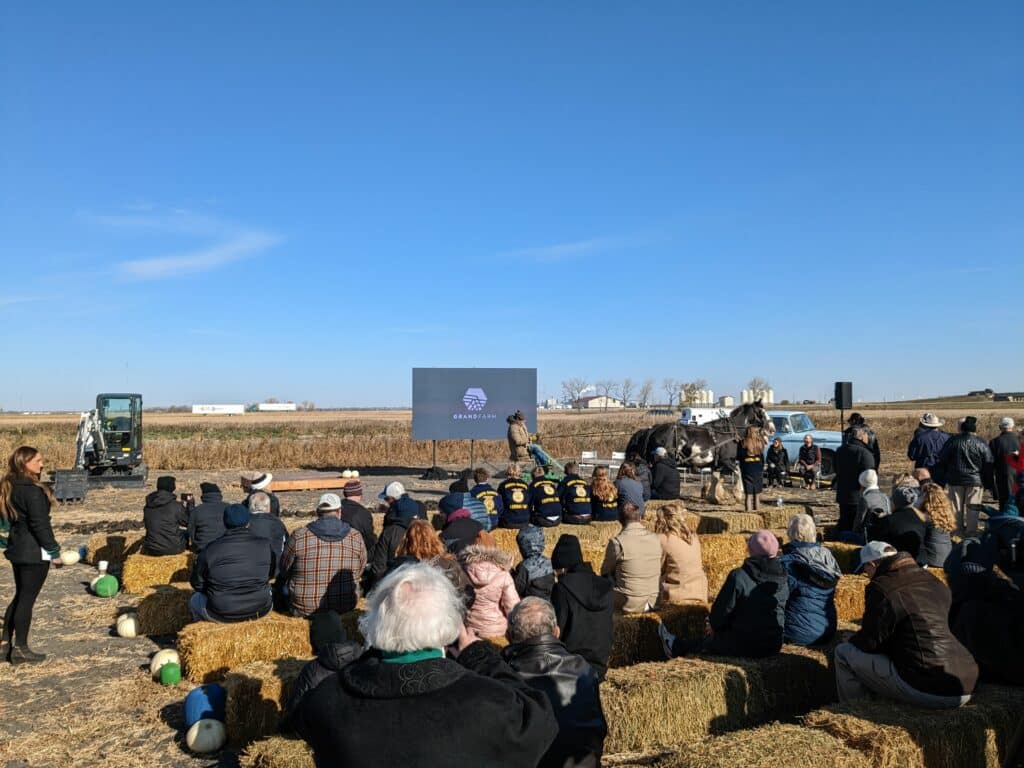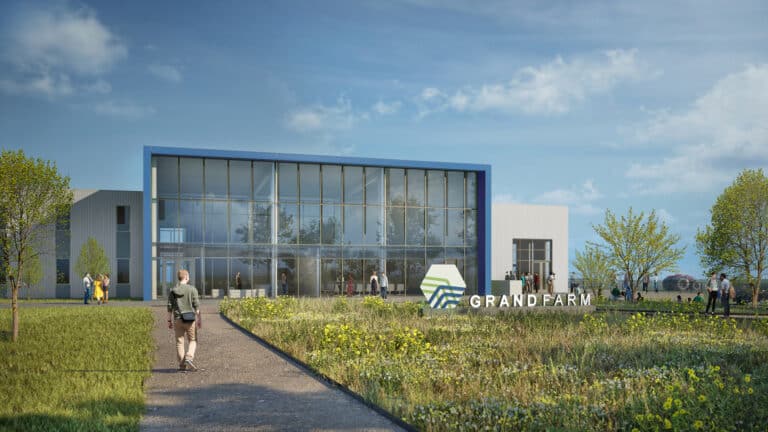A new building on the center is expected to be built and usable in 2023. The field center is expected to be a test ground for agricultural technology entrepreneurs and researchers — both public and private. Promoters expect it will help create tomorrow’s agricultural technologies, including “autonomous” tools to help farmers do more work with less labor.
On a sunny, 50-degree morning luminaries were Gov. Doug Burgum, U.S. Sen. John Hoeven, R-N.D., former Gov. Jack Dalrymple, former U.S. Secretary of Agriculture and former Gov. Ed Schafer, as well as businessman Gary Tharaldson. After the program, entrepreneurs and scientists demonstrated some of their autonomous research gear.
The event included demonstration of a single-bottom moldboard plow, drawn by a team of Clydedale horses, to an autonomous truck.
Sarah Lovas, a Grand Farm board member and agronomist from the Hillsboro, North Dakota, area, gave an impassioned welcome, saying “farmers, within their very fiber of who they are, want to innovate” and produce more with less inputs, and the Grand Farm is a perfect way to do.
Central Cass FFA member Samantha Burchill said she looked forward to having the Grand Farm in proximity to her chapter members.
“I look forward to seeing what kind of innovation Grand Farm brings in farm tech, and how my generation chooses to approach ag in the future,” she said.
Burgum called Grand Farm “a fantastic new platform for innovation” and ceremonially broke ground for the location — not with a shovel, but using a remote-controlled Bobcat machine, made in North Dakota. Others in the crowd received small, gold-colored shovels as mementos of the event.
The Grand Farm builds on “a lot of history of innovation,” but Burgum said that with over 50 private sector partners, plus the public sector and the research universities, “this is — as it always has been in ag — an opportunity to figure out how we producer more outputs with fewer inputs, whether those inputs are labor, seed or fertilizer. It’s not just about North Dakota, it’s about feeding the world.”
In February 2022, Burgum announced that the state Commerce Department had awarded Grand Farm a $10 million matching grant, for the purpose. The facility will be a 140-acre field test center, where researchers and developers will advance “autonomous agriculture” and other technology. The base for funding is a “pass-through” grant, funded by a $1 billion federal appropriation to the state from the American Rescue Plan to help the economy in the wake of COVID-19. The $10 million grant will be matched by donations to reach $20 million for the project.
Greg Tehven, chief executive officer and co-founder for Emerging Prairie, the non-profit that established Grand Farm, said his organization has accumulated 25% —or about $2.5 million — of what is being raised for the $10 million match to total the $20 million. The first $1.5 million came from Microsoft, a company, for whom Burgum once was a vice president.
Dirt access work started this week. Construction of buildings at the site will be achieved in 2023.
Where it’s due
“We worked to help secure funding and legislators provided $10 million in a matching grant,” Hoeven said, noting a federal, state, local and private sector partnership. “We’re going to be writing the future of precision agriculture in the next farm bill.”
Hoeven is running for election and has promoted his role in writing the multi-year farm bill.
Hoeven has been a supporter of the Grand Farm in many ways. However, he voted against the federal $1.9 trillion ARPA act that passed on March 11, 2021, which is the largest funding for the project to date. Bipartisan state legislators applied part of a $1 billion state piece of the COVID funds into a state Commerce Department grant for which Grand Farm was the only applicant. ARPA is also called the COVID-19 Stimulus Package that passed with largely Democrat votes.
Besides the 143 acres, Grand Farm plans a technology-enabled classroom, an innovation workshop for prototyping and developing technology and a demonstration space including a dirt track for demonstrating and testing autonomous and heavy equipment. There will be “innovation plots” for research projects.
Grand Farm’s in-town office base remains in Fargo in the Black Building in downtown Fargo, in the “Prairie Den” headquarters for the not-for-profit Emerging Prairie. (Burgum is the founder of the Kilbourne Group, which owns the building.
Event-full project
The idea for Grand Farm started in 2018 when ag engineering entrepreneur Barry Batcheller suggested an ag equipment/technology “major,” capitalizing on the region’s equipment heritage, with brands like Bobcat, Steiger, and his own Appareo.
In 2019, the Grand Farm project started staging activities at a “test site,” a 40-acre parcel near Horace. In 2020, Hoeven brought then-Secretary of Agriculture Sonny Perdue to attend the first ribbon-cutting and shovel ceremony for Grand Farm. That site hosted hundreds of projects with collaborating partners. The organization is collaborating with North Dakota State University, North Dakota and Red River Valley grower and research/promotion councils including soybeans, wheat/barley, corn and sugarbeets.
But the site was deemed too small, and — with the COVID funding available — Grand Farm looked elsewhere, and chose Casselton.
In vying for the center, Casselton officials suggested the site could become a “major tourist attraction with cultural and historical significance, an educational destination and as a venue with the potential to host thousands of people would impact our local economy in a positive manner” in addition to advancements.


